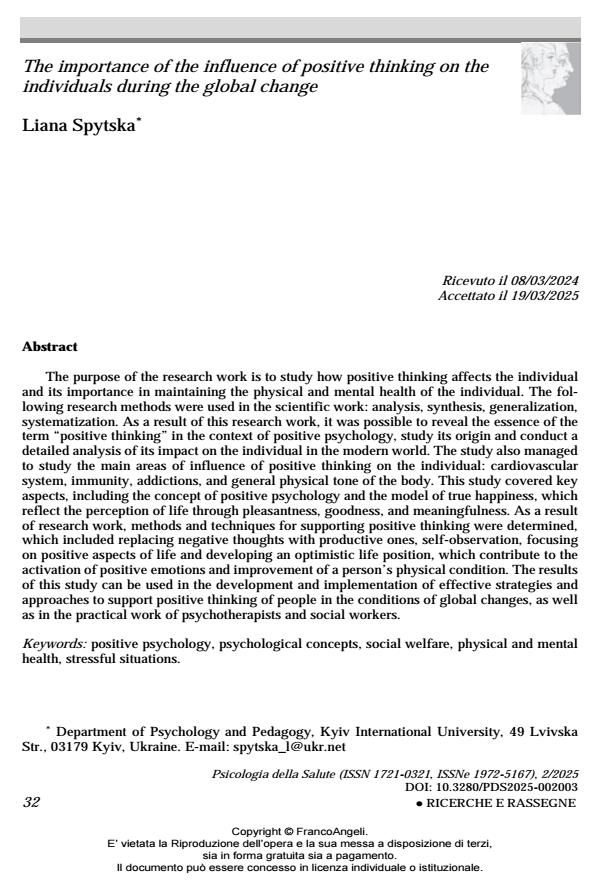The importance of the influence of positive thinking on the individuals during the global change
Titolo Rivista PSICOLOGIA DELLA SALUTE
Autori/Curatori Liana Spytska
Anno di pubblicazione 2025 Fascicolo 2025/2
Lingua Inglese Numero pagine 20 P. 32-51 Dimensione file 216 KB
DOI 10.3280/PDS2025-002003
Il DOI è il codice a barre della proprietà intellettuale: per saperne di più
clicca qui
Qui sotto puoi vedere in anteprima la prima pagina di questo articolo.
Se questo articolo ti interessa, lo puoi acquistare (e scaricare in formato pdf) seguendo le facili indicazioni per acquistare il download credit. Acquista Download Credits per scaricare questo Articolo in formato PDF

FrancoAngeli è membro della Publishers International Linking Association, Inc (PILA), associazione indipendente e non profit per facilitare (attraverso i servizi tecnologici implementati da CrossRef.org) l’accesso degli studiosi ai contenuti digitali nelle pubblicazioni professionali e scientifiche.
The purpose of the research work is to study how positive thinking affects the individual and its importance in maintaining the physical and mental health of the individual. The following research methods were used in the scientific work: analysis, synthesis, generalization, systematization. As a result of this research work, it was possible to reveal the essence of the term “positive thinking” in the context of positive psychology, study its origin and conduct a detailed analysis of its impact on the individual in the modern world. The study also managed to study the main areas of influence of positive thinking on the individual: cardiovascular system, immunity, addictions, and general physical tone of the body. This study covered key aspects, including the concept of positive psychology and the model of true happiness, which reflect the perception of life through pleasantness, goodness, and meaningfulness. As a result of research work, methods and techniques for supporting positive thinking were determined, which included replacing negative thoughts with productive ones, self-observation, focusing on positive aspects of life and developing an optimistic life position, which contribute to the activation of positive emotions and improvement of a person’s physical condition. The results of this study can be used in the development and implementation of effective strategies and approaches to support positive thinking of people in the conditions of global changes, as well as in the practical work of psychotherapists and social workers.
Lo scopo del lavoro di ricerca è studiare come il pensiero positivo influisce sull’individuo e la sua importanza nel mantenimento della salute fisica e mentale dell’individuo. I seguenti metodi di ricerca sono stati utilizzati nel lavoro scientifico: analisi, sintesi, generalizzazione, sistematizzazione. Come risultato di questo lavoro di ricerca, è stato possibile rivelare l’essenza del termine “pensiero positivo” nel contesto della psicologia positiva, studiarne l’origine e condurre un’analisi dettagliata del suo impatto sull’individuo nel mondo moderno. Lo studio è anche riuscito a studiare le principali aree di influenza del pensiero positivo sull’individuo: sistema cardiovascolare, immunità, dipendenze e tono fisico generale del corpo. Questo studio ha coperto aspetti chiave, tra cui il concetto di psicologia positiva e il modello di vera felicità, che riflettono la percezione della vita attraverso piacevolezza, bontà e significatività. Come risultato del lavoro di ricerca, sono stati determinati metodi e tecniche per supportare il pensiero positivo, che includevano la sostituzione di pensieri negativi con quelli produttivi, l’auto-osservazione, la focalizzazione sugli aspetti positivi della vita e lo sviluppo di una posizione di vita ottimistica, che contribuiscono all’attivazione di emozioni positive e al miglioramento delle condizioni fisiche di una persona. I risultati di questo studio possono essere utilizzati nello sviluppo e nell’implementazione di strategie e approcci efficaci per supportare il pensiero positivo delle persone nelle condizioni di cambiamenti globali, nonché nel lavoro pratico di psicoterapeuti e assistenti sociali.
Parole chiave:psicologia positiva, concetti psicologici, benessere sociale, salute fisica e mentale, situazioni stressanti.
Liana Spytska, The importance of the influence of positive thinking on the individuals during the global change in "PSICOLOGIA DELLA SALUTE" 2/2025, pp 32-51, DOI: 10.3280/PDS2025-002003